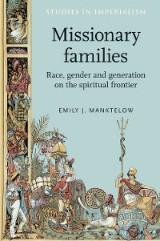Details

Missionary families
Race, gender and generation on the spiritual frontierStudies in Imperialism
|
34,99 € |
|
| Verlag: | Manchester University Press |
| Format: | EPUB |
| Veröffentl.: | 16.05.2016 |
| ISBN/EAN: | 9781526111524 |
| Sprache: | englisch |
| Anzahl Seiten: | 288 |
DRM-geschütztes eBook, Sie benötigen z.B. Adobe Digital Editions und eine Adobe ID zum Lesen.
Beschreibungen
Missionary families were an integral component of the missionary enterprise, both as active agents on the global religious stage and as a force within the enterprise that shaped understandings and theories of mission itself. Taking the family as a legitimate unit of historical analysis in its own right for the first time, Missionary families traces changing familial policies and lived realities throughout the nineteenth century and powerfully argues for the importance of an historical understanding of the missionary enterprise informed by the complex interplay between the intimate, the personal and the professional. By looking at marriage, parenting and childhood; professionalism, vocation and domesticity; race, gender and generation, this first in-depth study of missionary families reveals their profound importance to the missionary enterprise, and concludes that mission history can no longer be written without attention to the personal, emotional and intimate aspects of missionary lives.
Presents an innovative argument for the significance of missionaries’ familial relations in the philosophy, conduct and outcomes of mission work during the nineteenth century.
<p>General Editor's introduction<br>1. Introduction <br>2. The rise and fall of the missionary wife<br>3. Missionary marriage<br>4. The missionary family<br>5. Missionary mothers and fathers <br>6. Missionary children <br>7. Epilogue: Second-generation missionaries<br>8. Conclusion <br>Appendix <br>Bibliography<br>Index</p>
Emily J. Manktelow is a Lecturer in British Imperial History at the University of Kent
<p>Missionary families presents an innovative argument for the significance of missionaries’ familial relations in the philosophy, conduct and outcomes of mission work during the nineteenth century. With regional anchors in London, the Pacific and southern Africa, it uses both the personal writings of individual missionaries and the institutional records of the London Missionary Society to argue that the history of Christian mission can be redrawn. <br><br>Bringing together cultural, postcolonial and gendered approaches to history, Manktelow explores missionary marriage, parenting and childhood; issues such as life-cycle, life-stage and generation; and the interplay between discourses of difference mediated by both everyday interaction and complex cultural ideologies. Focusing on gendered identities of both male and female missionaries and how these impacted upon such things as professionalism on the one hand, and personal interaction on the other, overall this volume reflects upon the ways in which the institutional hub of the enterprise in London reacted to and dealt with the formal consequences of private lives. It concludes that missionary families had a profound impact upon the ideology and practice of Christian mission – and that mission history can no longer be written without attention to the personal, the intimate, and the affective aspects of missionary lives.<br><br>Attractive to academics and students alike, this book brings a fresh perspective to the history of Christian mission, and contributes to debates in the history of religion, imperialism and gender.</p>
Diese Produkte könnten Sie auch interessieren:

Belgien, Deutschland und die 'Anderen'

von: Sebastian Bischoff, Christoph Jahr, Tatjana Mrowka, Jens Thiel

35,99 €

Ancient Greece for Beginners: The History of Ancient Greece From the Bronze Age to Hellenism and From Apol-lo to Zeus Told in an Exciting and Entertaining Way

von: Markus Dannen, Casey Wayman

7,95 €














